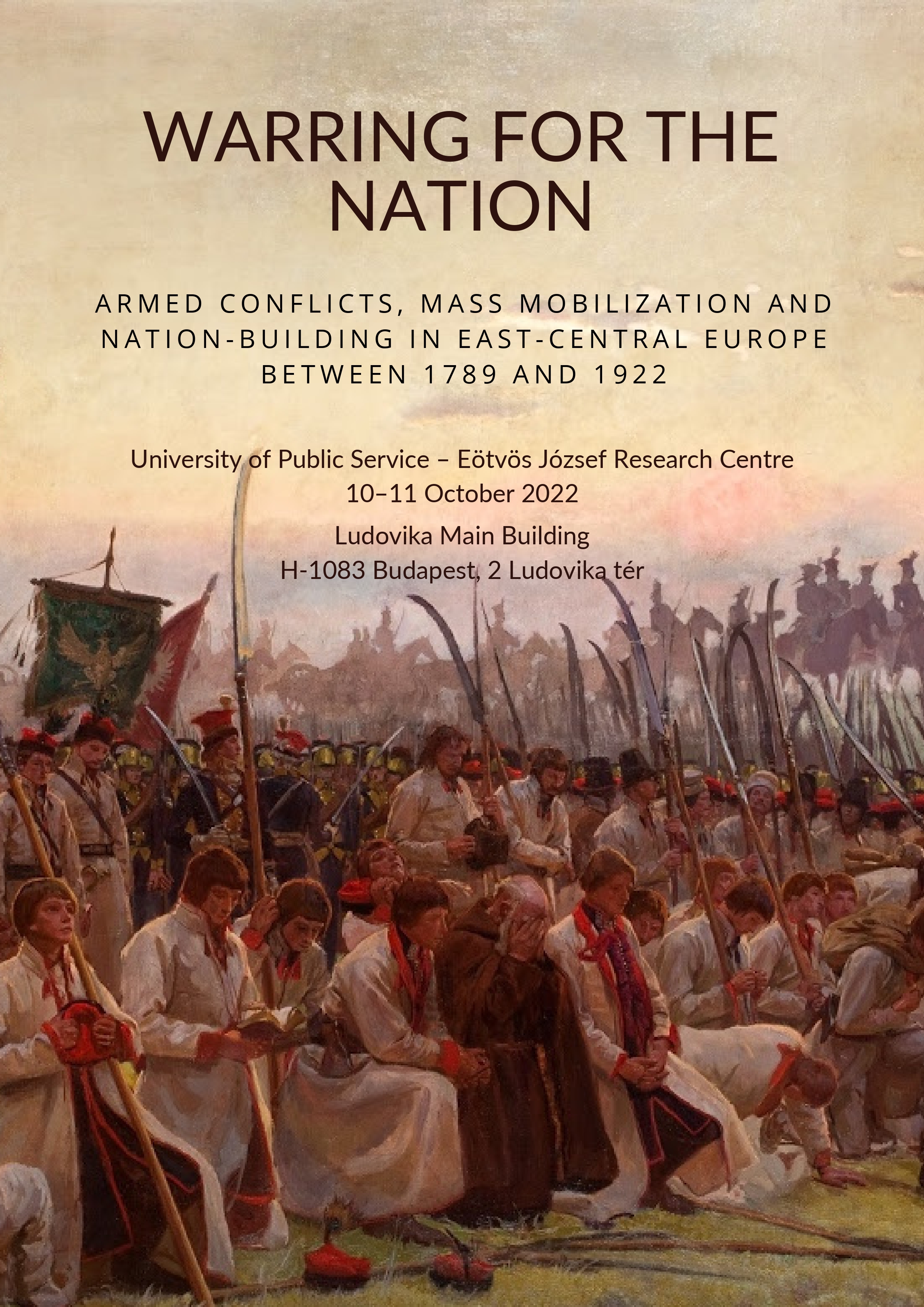Warring for the Nation. Armed conflicts, mass mobilization and nation-building in East-Central Europe between 1789 and 1922
1. emelet-100. Széchenyi Díszterem/Ludovika Főépület
Ludovika Főépület
 Pontszerző esemény!
Pontszerző esemény!
As recent examples in contemporary Europe clearly show, the role of armed conflicts in the state- and nation-building processes should not be underestimated in the contemporary era. This is even more evident when considering the history of Europe in the “long nineteenth century”: the massive interdependences between bellicism and nation have played a crucial role in the processes of collective identity-making since at least the French Revolution. In the early modern period, war was one of the major drivers of state formation in Europe.
However, whereas dynastic wars mainly involved the elites, implicating a rather limited role for the population, with the shaping of modern nations and nationalism, armed conflicts became increasingly “social” phenomena. In close interrelation with the tendency towards democratization and the broadening of political participation, wider and wider sections of society identified themselves with national ideas and the modern nation-state and accordingly could be mobilized to fight for causes and issues constructed in the increasingly nationalized political discourses.
Although the nineteenth-century in Europe was exceptionally peaceful compared to previous and subsequent periods, it had started with the French Revolution and the seriesof Napoleonic Wars and was terminated by the Great War, while the pan-European Revolutions of 1848–49 split it in two markedly different parts. Apart from the most important pan-European warring phases there were, nevertheless, several regional wars that proved to be crucial either immediately or in the long run for national movements and for emerging or even established nation-states alike, such as the Second Schleswig War, the Autro-Prussian and Franco-Prussian War, the Russo-Turkish War (1877-78) or the First and Second Balkan Wars. Finally, as is well known, the aftermath of the Great War brought a “golden age” of creating and restoring nation-states (along with self-styled ones) with the fall and the dismemberment of the great continental multi-ethnic empires in Europe.
The conference deals with aspects of the complex interconnectedness between (inter- and intrastate) armed conflicts and modern nationalism and nation-state building processes in Eastern and Central Europe (including the German-speaking territories, Austria-Hungary, the Balkans and European Russia) within the timeframe between 1789 and 1922.
Program:
Monday, 10. 10. 2022
Venue: Ludovika Main Building, Széchenyi Assembly Hall
15:30–16:00 Registration
16:00–16:20 opening remarks
16:00–18:00 Section I: Empires and Nations in Arms
16:20–16:40 Ilya Berkovich (Institute of Habsburg and Balkan Studies, Austrian Academy of Sciences, Vienna): An Empire in Arms: The Habsburg Monarchy and Its Army (1761/78–1868)
16:40–17:00 Ágoston Nagy (University of Public Service, Budapest): Competing Patriotic-valorous Masculinites: The Images of the "Hungarian Hussar" , the "Noble Warrior" and the "Armed Burgher" in 1809
17:00–17:20 Balázs Lázár (Institute and Museum of Military History, Budapest): The Hungarian Elite and the Organization of the Velites Light Cavalry Divisions during the War of the 6th Coalition in 1813
17:20–17:40 Frank Rochow (Max Planck Institute for Social Anthropology/Martin Luther University Halle-Wittenberg): Exercising Habsburg Rule in Krakau – the Role of the Military and Fortifications for Imperial State Building after 1848
17:40–18:00 Discussion
18:00–19:20 Keynote Lecture
18:00–19:00 Prof. Azar Gat (Tel Aviv University): War, Nationalism, the Peaceful Nineteenth Century and the Causes of Word War I
19:00–19:20 Q & A
19:20–20:30 BUFFET RECEPTION
Tuesday, 11. 10. 2022
Venue: Ludovika Main Building, Zrínyi Hall
10:00–11:50 Section II: The Nationalization of the Masses
10:00–10:20 Jacek Jędrysiak (University of Wrocław): The Failure of the “School of Nation” Concept – the Poles in the Prussian Army, 1816–1914
10:20–10:40 Michal Cáp – Vojtěch Kessler (Czech Academy of Sciences, Prague; Institute of Czech History, Faculty of Arts, Charles University, Prague): A Nation in Arms, or How Did Prussian Teachers Defeat Austrian Peasants in 1866?
10:40–11:00 Claudiu Craciun (National University of Political Studies and Public Administration, Bucharest): The Dialectics of War, Rebellion and Land Reform in Pre-War Romania
11:00–11:20 Vasilije Dragosavljević (Institute of History, Belgrade): The Theory of Integral Yugoslavism: a New Nation Tailored for a New State
11:20–11:40 Discussion
11:40–12:40 Lunch break
12:40–15:00 Section III: War, Violence and Identity Politics
12:40–13:00 Andreas Agocs (University of the Pacific, Stockton): War as State-Building in the Reconstruction of Central Europe, 1866-1920s
13:00–13:20 Michael Griff (Dresden State Art Collections): “Una guerra di emancipazione” – Transnational Volunteering between Garibaldinismo, Internationalism and Masculine Ideals
13:20–13:40 David Smrček (University of Vienna / Charles
University, Prague): Forming the “Nations in Arms”: Language and Violence in Cisleithania in 1897
13:40–14:00 Aliaksandr Piahanau (KTH Royal Institute of Technology, Stockholm): Habsburg Loyalists, Hungarian Patriots & Magyar Chauvinists: Transformations of the Burgher Shooting Associations in Budapest (1867–1914)
14:00–14:20 Nino Delić (Institute of History, Belgrade): Austro-Hungarian Prisoners of War in Serbia 1914–1915: Imperial Loyalty vs. National Identity
14:20–14:40 Discussion
14:40–15:00 Coffee break
15:00–16:40 Section IV: Symbols, Ideas and Identifications of the Warring for the nation
15:00–15:20 Aspasia Dimitriadi (EHESS, Paris): The Byzantine Mirror of the Triumphant Greece in the Years between 1910 and 1920
15:20–15:40 Efe Güzeloğlu (Istanbul Aydın University, Istanbul): From Turanism to Territorial Nationalism: The “Ten Years’ War” (1912–1922) and the Ideological Transformation of the Ottoman/Turkish Officers
15:40–16:00 Maja Vasiljević (University of Belgrade): Warring for the Nation through Music: Musicians from the Kingdom of Serbia during the Great War
16:00–16:20 Robert Andrzejczyk (Rzeszow University): Mobilizing Propaganda Posters during Polish Border Wars (1918–1921)
16:20–16:40 Discussion
16:40–17:00 Closing Discussion, Concluding Remarks
NKE hallgatók számára pontszerző esemény.
A rendezvény regisztrációköteles.
Lajtai László